The resurgence of the ketogenic diet—one that consists of 60 to 80 percent fat and very few carbohydrates (like, less than 10 percent of your diet, few)—is just that, a resurgence.
“It’s not new at all,” says Chris Mohr, Ph.D., R.D. A low-carb diet that makes up for what it lacks with fats is a model that aligns with the Atkins diet of the early 2000s. The theory behind it? It fires up a ketogenic state that allows your body to run on fat rather than glucose, melting excess fat by default.
“People have a misconception of keto being an all-meat diet, and that’s not true,” says Kristen Mancinelli, M.S., R.D., author of The Ketogenic Diet: The Scientifically Proven Approach to Fast, Healthy Weight Loss. It’s quite the opposite: “The more protein you eat, the more at-risk you are of not making it into the ketogenic state,” she says. You should know how to eat fat and lose fat without sacrificing nutrients, though, and as it turns out, serving up cheeseburgers with a smear of grease on the side for three meals a day isn’t necessarily the way to go. (Read everything you need to know about going keto here.)
A nutritious ketogenic regimen lies solely within the choices you make. Maintaining a wholesome diet while consuming fat full-time and essentially nixing carbs “may seem relatively easy in theory,” says Mascha Davis, M.P.H., R.D., spokesperson for the Academy of Nutrition and Dietetics, “but it actually makes meal planning quite restrictive.”
So, with the help of multiple experts, we’ve laid out what a week’s worth of keto eating looks like to give you some ideas. Use it as a guide to find a meal rotation that works for you.
MONDAY
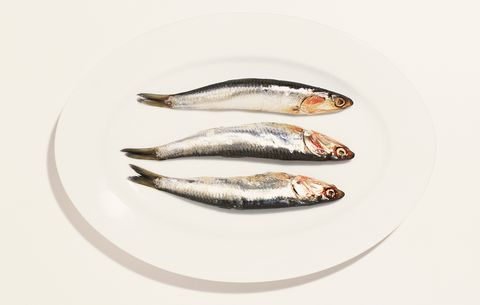
Breakfast: Two eggs cooked in coconut oil with half an avocado and six to 10 walnuts
If you think you’ve added enough extra oil to your cooking pan, double it for good measure, says Mancinelli.
Lunch: Three cups of arugula salad with an oil-based dressing and one serving of an oily fish, like sardines
“Believe it or not, greens have vastly different amounts of carbohydrates,” says Mancinelli. “Arugula has one to two carbohydrates per cup, whereas kale has seven. So, when you’re talking about a max amount per day of just 25 grams—that’s a big difference.”
Snack: A can of coconut milk, cream separated, with a scoop of peanut butter folded in, and frozen into “ice cream”
Dinner: Skin-on chicken thigh with cream sauce, cauliflower mash made with cream, butter, and oil, and roasted zucchini
Rather than the traditional meat, starch, and vegetable combo, Mancinelli recommends replacing the starch with an additional vegetable, and adding rich cream sauces to meet your fat requirement.
Related: 9 Keto-Friendly Snacks That Will Actually Keep You Full
TUESDAY
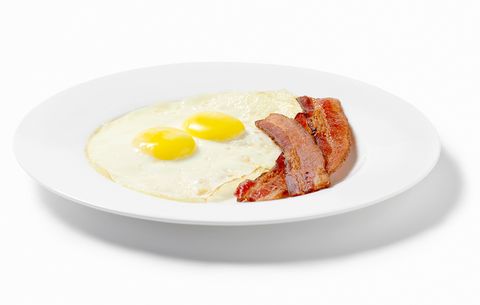
Heather Mangieri, M.S., R.D.N., C.S.S.D., spokesperson for the Academy of Nutrition and Dietetics recommends adding “as many low-carbohydrate vegetables to the daily meal plan as possible to maximize nutrients.” While she doesn’t believe you should deprive your body of nutrients found in keto-banned foods, here are her suggestions if you want to give it a go:
Breakfast: Two eggs with bacon, two cups of spinach, sautéed with onions, garlic, and olive oil, and half of a green pepper
Lunch: Grilled chicken breast with onion, six cherry tomatoes, and three cups of shredded mixed greens, cooked in olive oil
Snack: Almonds and a large celery stalk
Dinner: Five ounces of salmon with a cup of broccoli cooked in olive oil and other fat add-ons, like butter
“Fat helps to keep you full, and that helps to maintain a strict eating plan,” says Mangieri.
Related: How to Cook the Perfect Salmon In 10 Minutes Flat
WEDNESDAY
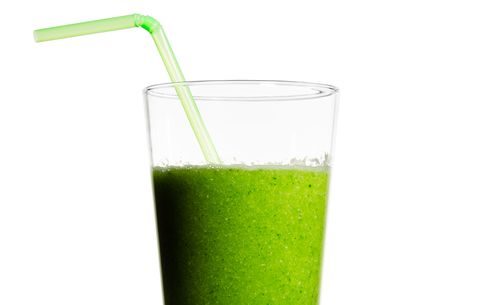
Breakfast: A smoothie made with unsweetened almond milk, low-carb protein powder (like this one or this one), spinach leaves, hemp seeds, almond butter, and avocado
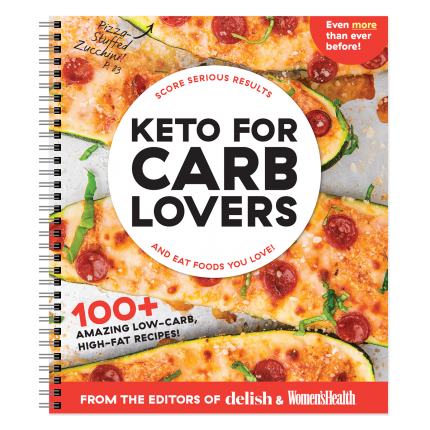
Mancinelli recommends rotating smoothie recipes until you find a fat-happy one that works for you. If you opt for a protein powder, it should have 5 grams of carbs or less, ideally 2 grams or less if you can swing it. Because you can’t eat a ton of fruit on keto (one apple could occupy your entire carb allotment for the day), you can punch things up with flax powder, coconut butter, cinnamon, and ginger.
Lunch: Spinach salad (darker, leafy greens are lower in carbs than your traditional Bibb or romaine) with tuna, thinly chopped cabbage, one whole avocado, a handful of sliced olives, hemp seeds, and parmesan cheese—all topped with a mostly oil-based vinaigrette
Snack: Flax seed crackers (like these) with goat Gouda
Dinner: Four ounces of fish with sugar-free tomato sauce and guacamole with a cup of asparagus smothered in a mustardy-mayonnaise
Mancinelli’s book has an entire section dedicated to keto-friendly condiments and sauces. Mayonnaise is mostly egg yolks and oil, which are both keto staples. Tomato sauce is better homemade, but if you’re in a pinch, just watch out for added sugar in the jarred varieties, she says.
Mash Perfect Guacamole:
THURSDAY
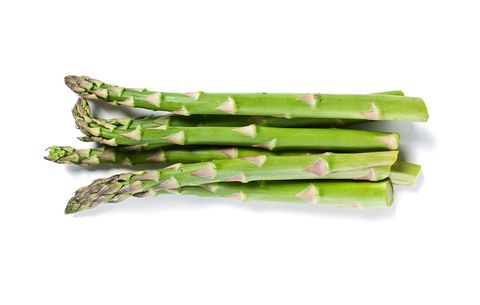
Breakfast: Leftovers. Ever had ribs for breakfast? It’s never too late to try. “A nice thing about the ketogenic diet is that you stop craving a ‘sweet’ meal in the morning,” Mancinelli writes.
Lunch: Ribeye steak with a whole avocado and sautéed spinach
Snack: Asparagus with aioli dipping sauce
Dinner: Pick-your-own-meatballs (try ground turkey, beef, or sausage) made with almond meal and broccoli cooked in oil
Related: 6 Things That Happen to Your Body When You Go On a Ketogenic Diet
FRIDAY
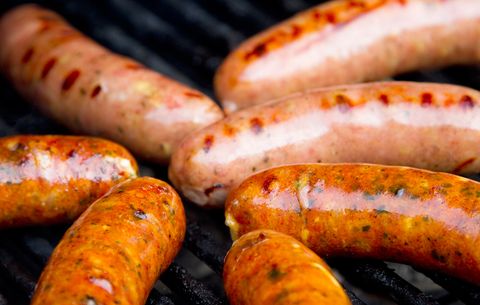
Breakfast: Plain Greek yogurt with a heaping spoonful of almond butter
There are few yogurts that are keto permitted, according to Mancinelli, “but there are some that fit the bill,” she says. “It has to be a full-fat yogurt and it can’t be sweetened.”
Lunch: Salt and pepper chicken breast paired with cauliflower mashed potatoes made in heavy cream, butter, and oil
Snack: Avocado and tomato slices, salted
Dinner: Italian spicy sausage links and broccoli rabe cooked in olive oil, sprinkled with grated Parmesan
Related: 12 Tasty Substitutions When Cutting Carbs
SATURDAY
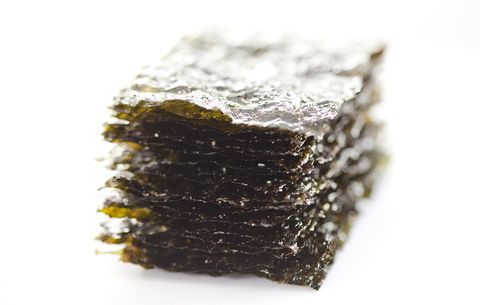
Breakfast: Spinach, onion, and mushroom omelet cooked in oil. Still hungry? Add a handful of nuts to the mix.
Lunch: Kitchen Sink salad. What’s in it? Everything but the kitchen sink. Mancinelli recommends a foundation of pre-washed greens, tomatoes, cucumbers, basil or mint, olives, hard cheese, and a protein of your choice, like chicken or fish. A sprinkle of sesame seeds is optional.
Snack: Seaweed snacks of any kind
Dinner: Kelp noodles (like these) and tofu strips with basil pesto, and a bowl of cream of mushroom soup
“Tofu is low in carbs and is a good food to have on rotation with meat, poultry, and fish as an entrée item,” writes Mancinelli. “This meal may seem like it’s on the lighter side, but the cream in the soup and the oil in the pesto are quite filling.” You can also try zucchini noodles here, but be aware that they have more carbs.
Related: 7 High-Protein Snacks That Will Help You Build Muscle
SUNDAY
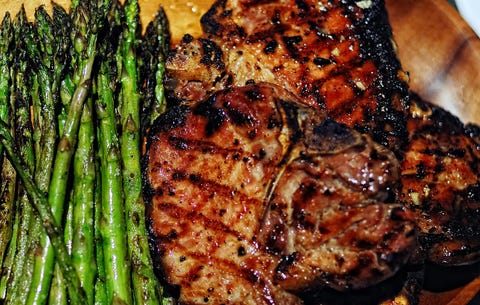
Breakfast: Mixed nuts and seeds in unsweetened almond milk, berries optional
Lunch: Tuna salad. The good news is, it’s likely that your go-to tuna salad recipe won’t need tweaking to be considered keto, as long as none of the ingredients contain added sugar. Tuna, mayo, celery, pickles, and some salt and pepper should do the trick. Just be sure to check your labels.
Snack: Cucumber sandwiches made with cheddar or Swiss cheese with a generous sprinkle of salt for that cracker-like flavor
Dinner: Spice-rubbed pork chops and asparagus cooked in olive oil
If it sounds like this diet requires a lot of time in the kitchen, that’s because it does. Keep in mind, though, that the ketogenic diet isn’t likely to be something you’ll do forever. That’s “probably not optimal,” says Mancinelli, “so think of it as something you’re going to do anywhere from eight to 12, to maybe 16 weeks.”
To lighten the day-to day prep, cook multiple portions at once, following the same keto structure of protein, non-starchy vegetables, and fats. “Once you get a few things like that under your belt, it’s not that hard,” says Mancinelli. “I think for people who are inclined to experiment, it’s actually a lot of fun.”
Source: Read Full Article
